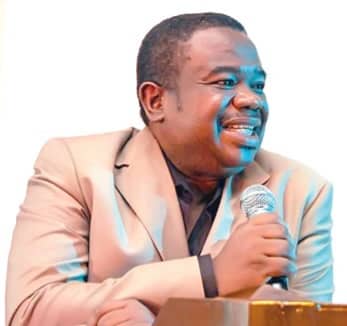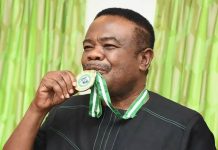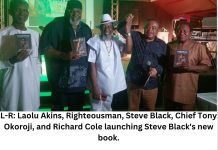Sir Victor Uwaifo was one of the major acts whose influence before the Nigerian civil war transcended the war. His monster hit “Joromi” released on the Philips label just before the Nigerian political crisis flared up in 1966, remained a dominant force as the war ended in 1970. The “Guitar Boy” of the Sweet Banana fame went on to score significantly with his Ekassa, Titibiti and Sasakosa series.
About 1971, the post war Nigerian recording industry began to gain tremendous strength. Sonny Okosun, who had operated under the radar for a while in the showbiz circle, used the period around 1972 to positively announce himself as a major act at EMI Nigeria. Okosun had performed in Benin City for a while as a second guitarist in Victor Uwaifo’s Melody Maestroes and then experimented in Enugu with bands like “The Postmen” and “Paperback Limited”. His 7” single, “Help” which had as its flip side another great song, “Don’t Cry” recorded at the EMI Wharf Road Studio in Apapa, was a major hit. Both songs had the immensely gifted singer, Perry Ernest Okocha on the vocals.
In 1972, a Briton named Peter Bond, touched down in Nigeria as Managing Director of Polygram which had acquired Philips. Bond appeared to take a big liking to Perry Earnest who sought a solo career at Polygram. At this point, the dashing Keji Okunowo who later became CEO of CBS and Sony Music Nigeria was cutting her teeth in the music industry as Public Relations Manager at Polygram, operating from Polygram’s Warehouse Road, Apapa head office.
With Perry Ernest gone, Sonny Okosun decided to grab the bull by the horn. He took over the mic and the lead singing in his band. Okosun added a big horn section to the band which section was led by trombonist, Fred Fisher who used to lead a band called the Granadians, resident at Granada Hotel at the Ojuelegba junction of Surulere. Okosun also brought in the locomotive drum sounds of Mosco Egbe, the keyboard wizardry of Jonny Woode Olimah , the guitar riffs of Spark Abiloye, the thumping bass of Ehimme Ottey and the group, Ozzidi took off like a bomb! To top up the attraction, a sexy group of female back-up singers and dancers like Claudia Pepple, Floxxy B, Margaret Akpan and Julie King became part of the group and Ozzidi was unassailable on stage! The rhythm section of Ozzidi was the core of the group that became known as SJOB Movement which subsequently with Prince Bola Agba, who passed on recently, became known as Jambos Express and released a significantly successful song called “Mother Africa”.
With Ozzidi, Sonny Okosun became a big activist and major voice in the anti-apartheid and African liberation movements. On the wings of Ozzidi, Okosun toured the African continent several times and made such great recordings as “Papa’s Land”, “Fire in Soweto”, “Mother & Child”, “African Soldier”, “Which Way Nigeria?” etc. and became the greatest and longest hit maker at EMI Nigeria managed by chartered accountant, Bode Akinyemi. What Sonny Okosun did was what had been expected of either Jonnie Haastrup, whose band “Monomono” had a massive hit on EMI titled, “Give the Beggar a Chance” or Segun Bucknor, whose “Soul Assembly” had experimented with some intriguing African rhythms in the evergreen song, “Poor Man no Get Brother’’. There were indeed suggestions from some quarters that what we know today as Afro Beat was created by Segun Bucknor but such suggestions evaporated because of Fela’s towering personality and his undisputed dominance of the music genre.
At about the same period, three urbane looking young men in Lagos, Beckley Ike Jones, Laolu Akintobi and Mike Odumosu broke into the scene with a three-piece band called BLO which had an unbelievable sound as big as a huge orchestra. The name, BLO was coined from the first letters of the names of the guitarist, Beckley Ike Jones, the drummer, Laolu Akintobi and the first letter of the surname of the bass player, Mike Odumosu. From BLO’s first album, “CHAPTER ONE” released by EMI, to “PHASE II”, “STEP 3” and “PHASE IV”, all of which came out on Decca’s Afrodisia label, BLO never quite achieved its potential in record sales but was red hot on stage and the girls simply went crazy whenever BLO came to town for a show.
Music fans thronged whatever venues BLO played, to listen to the guitar solos of Beckley Jones on his famous Fender Stratocaster guitar, the singing bass lines of Mike Odumosu and the magical drum rolls of Laolu Akins and to experience the big sounds of their flashy Orange loudspeakers and amplifiers provided by Decca. The fact that only three guys produced such great sound was part of the great legend of BLO. The group was also very professionally packaged by their manager and publicist, Tony Amadi, one of Nigeria’s best Entertainment journalists and publishers of all times. There was no argument that members of BLO were the best instrumentalists around and almost every recording artiste craved for some bars of the BLO sound in their recordings. The guys naturally became the most expensive session musicians in Nigeria. When Mike Odumosu moved on to join the trans-national group, “Osibisa”, Biddy Wright ‘Oladele’ took over as the ‘O’ in BLO. In later years, the ‘O’ in BLO was the incredibly talented keyboard player, Lemmy ‘Otu’ Jackson who also became one of Nigeria’s most successful producers responsible for hit songs from the likes of Oby Onyioha, Christy Essien Igbokwe and Onyeka Onwenu.
If EMI was the Mecca of pop artistes in Nigeria, Odion Iruoje was the Chief Imam. The fast talking and brash Producer and Artiste & Repertoire Manager at EMI, who neither had any formal training or apprenticeship in music, became one of the most powerful people in the Nigerian music industry. Iruoje scored a major hit with the band, “Ofege” featuring high school students from St Gregory’s College, Lagos. He simply gave fillip to the sweet schoolboy voice of lead singer, Melvin Noks Ukachi by throwing in the famed guitars of Beckley Jones to accompany the recordings of Ofege and all the kids in the streets were singing, “Wizzy Ilabo” and “Ofege is our name”!
As the mid-seventies strolled by, with the Udoji awards in the pockets of the Nigerian consumer, EMI was in business with such hit songs as “Still Searching” by Bongos Ikwue and the Groovies; “Beautiful Woman” by “Cloud 7” led by singer, Cliff David, “She’s My Choice” by “Sweet Breeze” fronted by Dallas King Anyanwu as lead singer; Basil Akalonu (Bazy Cole), who will be laid to rest in a fortnight, as drummer; Jackie Moore Anyaorah, who passed on in New Jersey a few years ago, as lead guitarist and Vincent Iketuonye as Bassist. There was also “Slim Fit Maggi” by Semi Colon led by Lasbrey Ojukwu and a couple of mild hits from Warri based Tony Grey with his Ozzimba. Later on, Odion Iruoje used the back-up sound of BLO in addition to the Cameroonian, George Achini on bass guitar, to make Kris Okotie’s “I Need Someone” on Haruna Ishola’s Phonodisc label, one of the most successful records in Nigerian history.
While EMI was not known for Highlife, it did extremely well with the music of Peacocks International Band of Owerri led by guitarist, Raphael Amarebem and singer, Dan Orji which produced hit songs like “Sambola Mama” and “Eddy Quansa” which will be remembered by many as the iconic signature tune of the NTA sitcom, “Masquerade”. EMI also sold hundreds of thousands of copies of the music of Apala legend, Ayinla Omowura. EMI was also selling a lot of reggae music by artistes like Jimmy Cliff, Jonny Nash, Peter Tosh, Bob Marley, Eric Donaldson, etc and scored positively with The Guyanese singer and producer, Eddy Grant, who had established a special relationship with the company.
Next week, we will examine the Juju music explosion at Decca West Africa, the emergence of Ayinde Barrister with Fuji music as a serious popular music form, the arrival of the Highlife guitar bands of Oriental Brothers and Oliver De Coque and the Ikwokirikwo craze fired by Ikenga Super Stars of Africa; the coming of the various locally owned labels, etc. Stay tuned. It will be interesting.
















